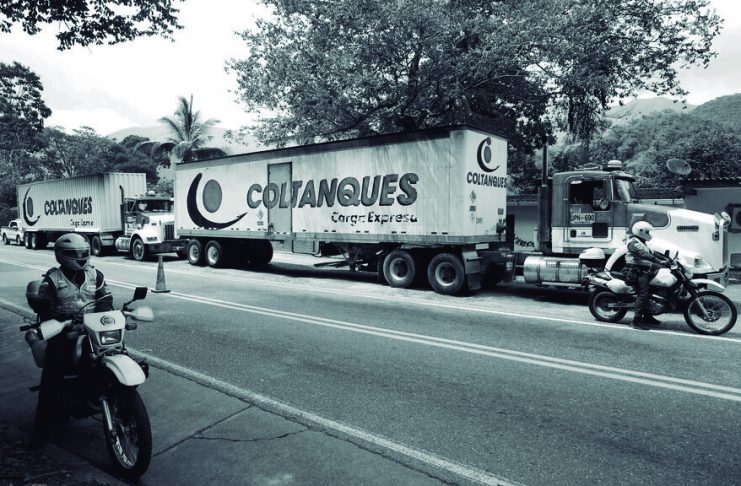Dos camiones llenos de víveres arribaron este jueves a la ciudad colombiana de Cúcuta, a un lado del puente fronterizo de Las Tienditas
Mientras una docena de países europeos y latinoamericanos se reunían en Uruguay para evaluar la crisis venezolana, dos primeros camiones de ayuda humanitaria para Venezuela arribaron el jueves a la ciudad colombiana de Cúcuta en un escenario que vuelve a mostrar el forcejeo entre el gobierno de Nicolás Maduro y la oposición.
Custodiadas por motocicletas y vehículos de la policía local, las unidades que transportan varias toneladas de ayuda llegaron a un centro de acopio que habilitó el gobierno colombiano en Cúcuta, a unos 500 kilómetros al noreste de Bogotá, a un lado del puente fronterizo de Las Tienditas. Junto a los dos camiones de carga iban otras siete unidades más pequeñas.
Al grito de «¡Arriba Venezuela!» algunas de las personas que encontraban a las afueras del centro de acopio celebraron el arribo de los camiones.
Aún no se conoce el mecanismo que se empleará para ingresar la ayuda humanitaria a Venezuela debido a que una de las vías que se utilizaría para ese fin permanecía cerrada. Otra de las incógnitas que rodea el proceso es la actitud que tendrían los militares, principal base de apoyo a Maduro, cuando los opositores traten de ingresar los cargamentos hacia territorio venezolano.
Parte de la ayuda humanitaria para los más necesitados en Venezuela la proporcionó Estados Unidos, que envió alimentos, suplementos nutricionales, kits de higiene y suministros médicos.
A pocas horas del arribo a Cúcuta de los primeros cargamentos, un hombre venezolano cuya esposa padece cáncer de mama instó a Maduro a que acepte la ayuda internacional.
Luis Escobar describió entre lágrimas cuando él y su esposa llegaron a Colombia para tratar su cáncer y los médicos les informaron que la enfermedad había avanzado significativamente. Escobar indicó que no quiere que otros venezolanos corran la misma suerte de su esposa y dirigiéndose al mandatario le pidió: «No te cuesta nada. Necesitamos los elementos básicos».
El gobierno venezolano ha rechazado el apoyo alegando que no existe una situación de emergencia en Venezuela y ha acusado a la oposición de propiciar una invasión militar.
First aid for Venezuela arrives at the collection center
Two trucks full of food arrived on Thursday in the Colombian city of Cúcuta, next to the Las Tienditas border bridge
While a dozen European and Latin American countries met in Uruguay to evaluate the Venezuelan crisis, two first aid trucks for Venezuela arrived on Thursday in the Colombian city of Cúcuta in a scenario that once again shows the struggle between the government of Nicolás Maduro and the opposition.
Guarded by motorcycles and local police vehicles, the units transporting several tons of aid arrived at a collection center set up by the Colombian government in Cúcuta, some 500 kilometers northeast of Bogotá, on the side of the Las Tienditas border bridge. . Along with the two cargo trucks were seven other smaller units.
To the cry of «¡Arriba Venezuela!» Some of the people who were on the outskirts of the collection center celebrated the arrival of the trucks.
The mechanism that will be used to enter humanitarian aid into Venezuela is not yet known because one of the routes that would be used for that purpose remained closed. Another of the unknowns that surrounds the process is the attitude that the military, the main support base for Maduro, would have when the opposition tries to enter the cargoes into Venezuelan territory.
Part of the humanitarian aid for the most needy in Venezuela was provided by the United States, which sent food, nutritional supplements, hygiene kits and medical supplies.
A few hours after the arrival in Cúcuta of the first shipments, a Venezuelan man whose wife suffers from breast cancer urged Maduro to accept international aid.
Luis Escobar described in tears when he and his wife arrived in Colombia to treat their cancer and the doctors informed them that the disease had progressed significantly. Escobar said he does not want other Venezuelans to share the same fate as his wife and, addressing the president, asked him: «It does not cost you anything, we need the basic elements.»
The Venezuelan government has rejected the support alleging that there is no emergency situation in Venezuela and has accused the opposition of propitiating a military invasion.

